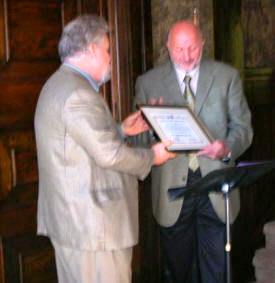
The Words of the Burgess Family

|
|
The Words of the Burgess Family |
|
Building Bridges Across Cultures: Bosnian Leader Embraces the AFP Vision
David Burgess
September 23, 2006

.Dr. Burgess appoints Dr. Saracevic an Ambassador for Peace
On Saturday, September 23rd, a group of about 30, including Ambassadors for Peace with their family and friends, gathered in Seattle at our beautiful facility on Lake Washington. The purpose of the event was to address the question, "Islam and World Peace." Our featured speaker was the head of the Muslim Bosniak community in the Greater Seattle area, Dr. Muhamed Saracevic.
Through Imam Abdullah Polovina I had been invited to speak at their annual commemoration ceremony for the victims of Srebrenica. Srebrenica was only the lowlight of a bloody civil war in Bosnia that claimed the lives of tens of thousands of mostly Muslim Bosnians.
Dr. Saracevic shared his insights on the topic of Islam and world peace. By pure chance our meeting had been scheduled for the first day of the just concluded month of Ramadan, one of the five pillars of Din, which form the basis of Islam. (The others include belief in one God, daily prayers, charity and, if possible, at least one pilgrimage to Mecca, the most holy site in Islam.)
This month of fasting for spiritual purification became the focal point of Dr. Saracevicís thoughts about the relationship between Islam and peace. He shared that the purpose of Ramadan was to help Muslims remove any sin from their lives, which includes making peace with anyone they have wronged during the year, as well as strengthening ties with family and friends and generally "clean up" every aspect of their lives. The Arabic word for fasting, sawn, literally means to refrain, not only from food, but from evil thoughts and deeds. Dr. Saracevic went on to discuss the problems between East and West, Islam and the Judeo-Christian tradition in a very frank, candid manner. "Muslims," he said, "have failed to come [up] with a genuine idea of globalization, and in addition they are in general unable to live in a global world. Muslims have no global strategy; they have no global mind or mentality; Ö Above all, and most unfortunately, they have an image of threatening the freedom and security of the world; they have the stigma of global terrorism."
Dr. Saracevic then addressed some of the key elements in the so-called "clash of civilizations." He criticized the East for being too weak to live up to the ideals of Islam that include freedom, democracy and human rights. As he explains, "the bitter truth is that Islam is used to defend Muslims rather than the Muslims being in service to defend Islam by their good examples." However, the West has rather arrogantly dismissed the sincere morality of most Muslims and given the religion a stigma as little more than a cover for terrorism. He warns that those who do so "forget, however, that Islam is not Communism and that the Muslim World is not like the former Soviet Union. Islam is the way of life that is compatible with the way of common reason and human decency both in the West and in the East."
So, what is the solution? Dr. Saracevic argues that "the sooner we realize the urgent need to overcome the history of enmity the better for both of Islam and the Western World. The Muslims have to give an adequate place in their thought about Western history and the Western World must realize that Islam has its history in the West and take into account the fact that many Western World countries have sizeable Muslim populations. This is the more urgent, as existing prejudices against Islam are continuously nourished by a mix of political events, cultural differences and an active ignorance."
Despite Dr. Saracevicís eloquent plea for mutual understanding and co-operation, the most powerful moment of his presentation did not come until the question and answer period. When asked what Muslims could do to stop fellow Muslims from committing acts of violence, he shared about his experience as a medical doctor during the Bosnian civil war, as he worked in literally freezing conditions with no heat and few medical supplies to save the lives of those wounded during the conflict, not knowing from day to day whether our not he would survive. This, of course, all took place in a war in which Muslims were being attacked by Christians. He shared how, based upon his religion, he had worked to forgive those who had injured him and his people. We were all deeply moved by his testimony and felt that Dr. Saracevic had been called to demonstrate the principles of the Ambassador for Peace in ways that most of us, living in America, could only imagine.
As a final thought, I would like to add that many among us would likely object to the notion that those people who attacked and killed Bosnian Muslims were "Christian." Such behavior does not emanate from the teachings of Christ. So too the, we must recognize that the actions of terrorists do not derive from the teachings of Islam. We need to overcome our "cultural difference and active ignorance" in order to make peace.
Download entire page and pages related to it in ZIP format
Table of Contents
Information
Tparents Home